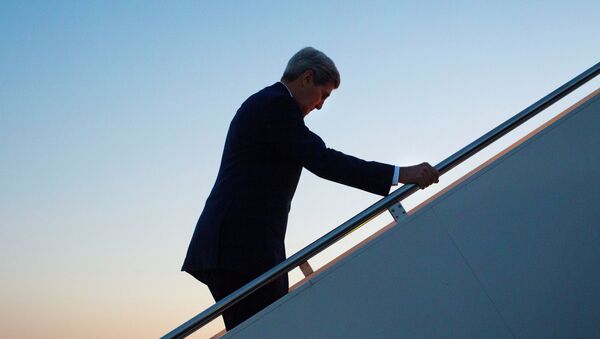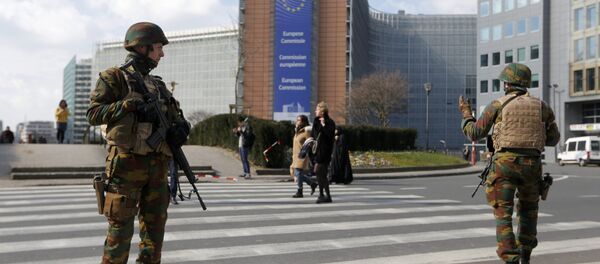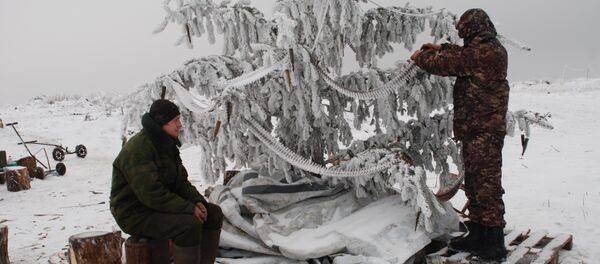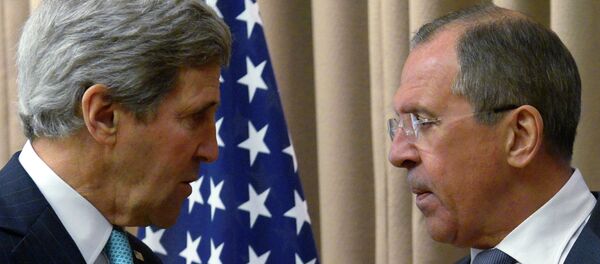Offering an analysis of the US secretary of state's impending visit to the Russian capital, prominent Russian business magazine Expert emphasizes that while the likely topics of discussion have been well-publicized, many details, including elements of the visit itself, remain shrouded in mystery.
"In fact, the intrigue emerged shortly after the visit was announced," the magazine notes. "To begin with, we learned about it only a week in advance, which points to its urgency."
"Secondly, it was initially said that John Kerry would stay in Moscow for almost four days – a tremendous amount of time for the head of the diplomatic service of a superpower. There are two possible explanations for this: either Kerry's schedule did not match up with Putin's (with whom he very much needs to meet), or he intended to work out some complex agreements requiring major compromises," and hence, expanded discussions.
Keeping Ukraine Frozen
The visit's key themes, Ukraine and Syria, have been revealed. "The first issue is the most difficult for Moscow, but is there anything to discuss?" Expert asks.
"Yes, the US Secretary of State has said that 'Russia has a simple choice: [to] fully implement Minsk or continue to face economically damaging sanctions'. However, it is unlikely that he is going to say something like this to Putin."
"Everyone, including Mr. Kerry, knows perfectly well that the lion's share of the blame for the obstruction of the Minsk Agreement falls on Kiev, which cannot or does not want to implement its articles. Furthermore, if one were to take a look at the text's first 12 specific points, one will find that Ukraine is currently violating every one of them, starting with violations of the ceasefire and the refusal to implement the agreement's political articles, and ending with the failure to comply with article 10 (for the withdrawal of foreign units from Ukrainian territory – US forces are officially based in the west of the country)."
Ultimately, Expert suggests, when it comes to the Ukraine issue, Moscow and Washington have reached a stalemate, and Kerry's visit is unlikely to cause any tectonic shifts.
"The United States managed to convince the European Union that Ukraine is a serious problem, and that the future and security of Europe depends on Ukraine, but even the Europeans understand that they have nothing more to pressure Russia with," Viktor Kremeniuk, the deputy director of the Moscow-based Institute of the US and Canada told the magazine.
At the same time Moscow, for its part, "understands that Kiev is not ready to implement the Minsk agreements," even though they are "the only method of transforming Ukraine into a more or less viable entity."
"As a result, the Ukrainian question, most likely, will be frozen for an indefinite period, with Washington, Brussels and Moscow needing only to periodically measure the temperature of the conflict and keep Petro Poroshenko from making any attempts to disrupt the status quo."
Syria Under the Looking Glass
"The Syrian situation," Expert notes, "looks more interesting. According to John Kirby, the sides will discuss "ongoing efforts of the International Syrian Support Group to maintain the cessation of hostilities, provide aid and improve and expand humanitarian access, and facilitate a political transition in Syria, while also combating Daesh."
"By all appearances, some kind of framework agreement has been reached," expressed in the Geneva peace talks and the ceasefire agreement, the latter worked out in coordination with the US. "However," the magazine notes, "the devil is in the details."
"And these details are many: Damascus's unwillingness to accept the partition of Syria, difficulties in Russian-Iranian negotiations, Moscow tying the Syrian issue to global cooperation with the US, the absence of a clear American position regarding Syria's future (Washington wants autonomy for Syrian Kurdistan, but doesn't know how to sell this to its Turkish partners), and finally, the US's inability or unwillingness to control their clients among the Syrian opposition factions."
"The delays with bringing into force the agreed rules for reacting to violations of the cessation of hostilities in Syria are not acceptable. Every day, provocations and shelling there kills civilians," Rudskoy added.
Ultimately, Expert notes, "by all appearances, the goal of the Moscow meeting will be to exorcise the devil from all these details. It's true that if an exorcism does not take place, there will be no critical consequences for the failure. The two sides will simply come out even. The Americans will continue to support the opposition and at the same time will not interfere [directly] in the Syrian war. And Russia will continue to sponsor peace talks between Damascus and local sheikhs outside the Geneva process."
"However, in light of the events in Brussels, a Russian-American compromise becomes all the more important. As was rightly pointed out by Viktor Ozerov, the chair of the Defense and Security Committee of Russia's senate, the terror attacks in Brussels have proven once again the need for international cooperation in the fight against this scourge, 'regardless of political preferences, ambitions and trends.'"
In this situation, "given Washington's capabilities and Moscow's determination, such cooperation would be very helpful in the fight against Daesh – in Syria and elsewhere," the magazine concludes.




